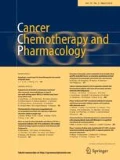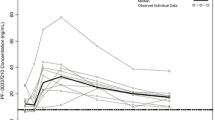Abstract
Purpose
This two-part, open-label, non-randomized dose-escalation study aimed to define the maximum tolerated dose (MTD) of BI 836880 (humanized bispecific nanobody® targeting vascular endothelial growth factor and angiopoietin-2) as monotherapy and in combination with ezabenlimab (programmed death protein-1 inhibitor) in Japanese patients with advanced and/or metastatic solid tumors.
Methods
In part 1, patients received an intravenous infusion of BI 836880 at 360 or 720 mg every 3 weeks (Q3W). In part 2, patients received BI 836880 at doses of 120, 360, or 720 mg in combination with ezabenlimab 240 mg Q3W. The primary endpoints were the MTD and the recommended phase II dose (RP2D) of BI 836880 as monotherapy and in combination with ezabenlimab, based on dose-limiting toxicities (DLTs) during the first cycle.
Results
Twenty-one patients were treated; nine in part 1 and 12 in part 2. No DLTs were reported in either part and the MTD was not reached. The RP2Ds were BI 836880 720 mg Q3W as monotherapy and BI 836880 720 mg plus ezabenlimab 240 mg Q3W. The most common adverse events were hypertension and proteinuria (33.3%) with BI 836880 monotherapy and diarrhea (41.7%) with the combination. Four patients (44.4%) in part 1 had stable disease as best overall tumor response. In part 2, two patients (16.7%) had confirmed partial responses and five had stable disease (41.7%).
Conclusion
MTD was not reached. BI 836880 alone and in combination with ezabenlimab had a manageable safety profile with preliminary clinical activity in Japanese patients with advanced solid tumors.
Trial registration and date
NCT03972150, registered on June 3, 2019.



Similar content being viewed by others
Data availability
To ensure independent interpretation of clinical study results and enable authors to fulfill their role and obligations under the ICMJE criteria, Boehringer Ingelheim grants all external authors access to clinical study data pertinent to the development of the publication. In adherence with the Boehringer Ingelheim Policy on Transparency and Publication of Clinical Study Data, scientific and medical researchers can request access to clinical study data when it becomes available on https://vivli.org/, and earliest after publication of the primary manuscript in a peer-reviewed journal, regulatory activities are complete, and other criteria are met. Please visit https://www.mystudywindow.com/msw/datasharing for further information.
Change history
10 July 2023
The original version is updated due to minor corrections and realignment of text.
References
Li T, Kang G, Wang T, Huang H (2018) Tumor angiogenesis and anti-angiogenic gene therapy for cancer. Oncol Lett 16(1):687–702. https://doi.org/10.3892/ol.2018.8733
Fukumura D, Kloepper J, Amoozgar Z, Duda DG, Jain RK (2018) Enhancing cancer immunotherapy using antiangiogenics: opportunities and challenges. Nat Rev Clin Oncol 15(5):325–340. https://doi.org/10.1038/nrclinonc.2018.29
Rahma OE, Hodi FS (2019) The intersection between tumor angiogenesis and immune suppression. Clin Cancer Res: Off J Am Assoc Cancer Res 25(18):5449–5457. https://doi.org/10.1158/1078-0432.Ccr-18-1543
Akinleye A, Rasool Z (2019) Immune checkpoint inhibitors of PD-L1 as cancer therapeutics. J Hematol Oncol 12(1):92. https://doi.org/10.1186/s13045-019-0779-5
Hofmann IBA, Hilberg F, Chesa PG, Depla E, Boucneau J, Kraut N, Künkele K-P (2015) Dual targeting of angiogenesis pathways: combined blockade of VEGF and Ang2 signaling. 8th Euro Global Summit on Cancer Therapy
Gerald D, Chintharlapalli S, Augustin HG, Benjamin LE (2013) Angiopoietin-2: an attractive target for improved antiangiogenic tumor therapy. Can Res 73(6):1649–1657. https://doi.org/10.1158/0008-5472.Can-12-4697
Huang H, Bhat A, Woodnutt G, Lappe R (2010) Targeting the ANGPT-TIE2 pathway in malignancy. Nat Rev Cancer 10(8):575–585. https://doi.org/10.1038/nrc2894
Tourneau CL, Claus R, Ricci F, Hackanson B, Rummelt C, Fietz O, Arnhold T, Roy D, Oum’Hamed Z, Fritsch RM (2018) First-in-human phase I trial of BI 836880, a vascular endothelial growth factor (VEGF)/angiopoietin-2 (Ang-2)-blocking nanobody, given every 3 weeks (q3w) in patients (pts) with advanced/metastatic solid tumors. J Clin Oncol 36(15_suppl):12024–12024. https://doi.org/10.1200/JCO.2018.36.15_suppl.12024
Johnson ML, Patel MR, Siu LL, Kozloff M, Aljumaily R, Vaishampayan UN, Elgadi MM, Ge M, Duffy C, Graeser R, Khedkar SV, Jones SF, Burris HA (2018) Phase I trial of the programmed death receptor 1 (PD-1) inhibitor, BI 754091, in patients (pts) with advanced solid tumors. J Clin Oncol 36(5_suppl):212–212. https://doi.org/10.1200/JCO.2018.36.5_suppl.212
Le Tourneau C, Becker H, Claus R, Elez E, Ricci F, Fritsch R, Silber Y, Hennequin A, Tabernero J, Jayadeva G, Luedtke D, He M, Isambert N (2022) Two phase I studies of BI 836880, a vascular endothelial growth factor/angiopoietin-2 inhibitor, administered once every 3 weeks or once weekly in patients with advanced solid tumors. ESMO Open 7(5):100576. https://doi.org/10.1016/j.esmoop.2022.100576
Isambert N, Elez E, Zanetta S, Matos I, Nazabadioko S, Xue W, Carrière P, Tabernero J (2018) A phase I, open-label dose-escalation trial of weekly (qw) BI 836880, a vascular endothelial growth factor (VEGF)/angiopoietin-2 (Ang-2)-blocking nanobody, in patients (pts) with advanced/metastatic solid tumors. J Clin Oncol 36(15_suppl):e24013–e24013. https://doi.org/10.1200/JCO.2018.36.15_suppl.e24013
Patel MR, Johnson ML, Winer I, Arkenau H-T, Cook N, Samouëlian V, Aljumaily R, Kitano S, Duffy C, Ge M, Elgadi M, Siu LL (2021) 542P Ezabenlimab (BI 754091) monotherapy in patients (pts) with advanced solid tumours. Ann Oncol 32:S606–S607. https://doi.org/10.1016/j.annonc.2021.08.1064
Girard N, Wermke M, Barlesi F, Kim D-W, Ghiringhelli F, Bennouna J, Lesimple T, Felip E, Berz D, Lee J-S, Landsteiner HT, Chen V, Jayadeva G, Alt J, Hackanson B (2021) PD1-1-1 phase Ib study of BI 836880 (VEGF/Ang2 nanobody®) plus ezabenlimab (BI 754091, anti-PD-1 antibody) in patients with solid tumors. Ann Oncol 32:S325. https://doi.org/10.1016/j.annonc.2021.05.550
Han K, Peyret T, Marchand M, Quartino A, Gosselin NH, Girish S, Allison DE, Jin J (2016) Population pharmacokinetics of bevacizumab in cancer patients with external validation. Cancer Chemother Pharmacol 78(2):341–351. https://doi.org/10.1007/s00280-016-3079-6
Finn RS, Qin S, Ikeda M, Galle PR, Ducreux M, Kim T-Y, Kudo M, Breder V, Merle P, Kaseb AO, Li D, Verret W, Xu D-Z, Hernandez S, Liu J, Huang C, Mulla S, Wang Y, Lim HY, Zhu AX, Cheng A-L (2020) Atezolizumab plus bevacizumab in unresectable hepatocellular carcinoma. N Engl J Med 382(20):1894–1905. https://doi.org/10.1056/NEJMoa1915745
Socinski MA, Jotte RM, Cappuzzo F, Orlandi F, Stroyakovskiy D, Nogami N, Rodríguez-Abreu D, Moro-Sibilot D, Thomas CA, Barlesi F, Finley G, Kelsch C, Lee A, Coleman S, Deng Y, Shen Y, Kowanetz M, Lopez-Chavez A, Sandler A, Reck M (2018) Atezolizumab for first-line treatment of metastatic nonsquamous NSCLC. N Engl J Med 378(24):2288–2301. https://doi.org/10.1056/NEJMoa1716948
Funding
This work was supported by Boehringer Ingelheim International GmbH. Medical writing support for the development of this manuscript, under the direction of the authors, was provided by Hannah Simmons, MSc, of Ashfield MedComms, an Inizio Company, and funded by Boehringer Ingelheim. The authors received no direct payment for development of the manuscript; this does not exclude direct payment for carrying out the study.
Author information
Authors and Affiliations
Contributions
NY: investigation; TK: investigation, resources; TS, investigation, resources; AT: investigation; TK: investigation, resources; DE: conceptualization, methodology, formal analysis, resources; AS: conceptualization, methodology, formal analysis, investigation, data curation; BL: methodology, formal analysis; JH: methodology, formal analysis; KY: resources. All authors were involved in the reviewing and editing of the manuscript, approved the final version to be published, and agree to be accountable for all aspects of the work in ensuring that questions related to the accuracy or integrity of any part of the work are appropriately investigated and resolved.
Corresponding author
Ethics declarations
Conflict of interest
Noboru Yamamoto reports receiving honoraria from AstraZeneca, Bristol Myers Squibb, Chugai Pharmaceutical, Eli Lilly, Ono Pharmaceutical, and Sysmex; consulting/advisory fees from Boehringer Ingelheim, Cimic, Eisai, Otsuka, and Takeda Pharmaceuticals; and research funding (institution) from Astellas Pharma, Bayer, Bristol Myers Squibb, Boehringer Ingelheim, Chiome Bioscience, Chugai Pharmaceutical, Daiichi Sankyo, Eisai, Eli Lilly & Co, Genmab, GlaxoSmithKline, Janssen Pharma, Kyowa Hakko Kirin, Merck Sharp & Dohme, Merck, Novartis, Ono Pharmaceutical, Otsuka, Pfizer, Quintiles, Sumitomo Dainippon, Taiho Pharmaceutical, Takeda Pharmaceuticals, Shionogi, KAKEN, and TORAY. Takafumi Koyama reported receiving personal fees from Chugai and Sysmex and grants from PACT Pharma, Chugai, Novartis, Eli Lilly and Company, Pfizer, Loxo Oncology, and Takeda Oncology. Toshio Shimizu declares grants from Novartis, Eli Lilly and Company, AbbVie, Daiichi-Sankyo, Eisai, Bristol-Myers Squibb, AstraZeneca, Pfizer, Loxo Oncology, Takeda Oncology, Incyte, Chordia Therapeutics, 3D-Medicine, Symbio Pharmaceuticals, PharmaMar, and Astellas. Akiko Todaka received honoraria from Taiho Pharmaceutical, Ono Pharmaceutical, Yakult Honsha and Nihon Servier. Takeshi Kawakami received honoraria from Taiho Pharmaceutical, Ono Pharmaceutical, and Bristol-Myers Squibb. Damijan Erzen, Akiko Sarashina, Bin Li and Jianrui Hou report being employed by Boehringer Ingelheim. Kentaro Yamazaki reported receiving honoraria from Chugai Pharma, Daiichi Sankyo, Yakult Honsha, Takeda, Bayer, Merck Serono, Taiho Pharmaceutical, Lilly, Sanofi, Ono Pharmaceutical, MSD, Bristol Myers Squibb; and institutional research funding from Taiho Pharmaceutical.
Additional information
Publisher's Note
Springer Nature remains neutral with regard to jurisdictional claims in published maps and institutional affiliations.
Supplementary Information
Below is the link to the electronic supplementary material.
Rights and permissions
Springer Nature or its licensor (e.g. a society or other partner) holds exclusive rights to this article under a publishing agreement with the author(s) or other rightsholder(s); author self-archiving of the accepted manuscript version of this article is solely governed by the terms of such publishing agreement and applicable law.
About this article
Cite this article
Yamamoto, N., Koyama, T., Shimizu, T. et al. Phase I study of the VEGF/Ang-2 inhibitor BI 836880 alone or combined with the anti-programmed cell death protein-1 antibody ezabenlimab in Japanese patients with advanced solid tumors. Cancer Chemother Pharmacol 91, 469–480 (2023). https://doi.org/10.1007/s00280-023-04527-6
Received:
Accepted:
Published:
Issue Date:
DOI: https://doi.org/10.1007/s00280-023-04527-6




